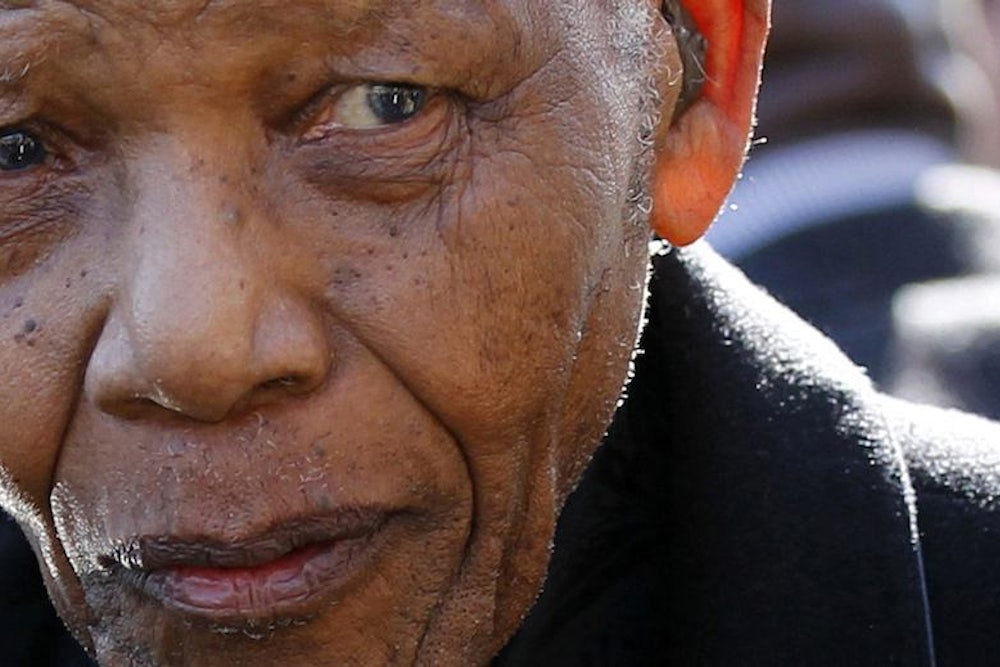Before Congressional Republicans in the U.S. lionized Nelson Mandela, they despised him. And they opposed not just the great freedom fighter himself but the entire anti-apartheid movement. Even worse, they took actions that damaged the cause of equality in South Africa. Not for nothing did Bishop Desmond Tutu call Ronald Reagan’s policy towards the country “immoral, evil and totally un-Christian.” Conservative Americans’ pro-apartheid actions are not just shameful history—they are similar, in some ways, to their actions to rid the world of political Islam.
The Kennedy administration had opposed the Afrikaner government, instituting an arms embargo on the country. Henry Kissinger and Richard Nixon, conversely, muted criticism of the regime and opened channels of communications, in order to defeat the Soviets in the Third World. As part of his human rights-focused foreign policy, Jimmy Carter reversed course, imposed restrictions and sanctions on the apartheid government, which Mandela and his party, the African National Congress, requested.
Reagan not only removed the restrictions; he embraced the South African Apartheid regime. He instituted a policy euphemized as “constructive engagement.” Reagan said that the United States lacked the power to change the internal workings of the Afrikaner government. Not only was the claim false, it contradicted his position on the far more powerful Soviet Union, which was designed precisely to change the evil empire’s internal behavior. Reagan put Mandela on the U.S. terrorist list, a placement that wasn’t removed until 2008, incredibly. This was at a time when the South African civil war was at its peak of violence, with the conflict becoming a global cause.
In 1985, after the South African government committed some of its worst atrocities against blacks, Congress voted to impose sanctions against the country. This was a time when America accounted for about one-fifth of direct foreign investment in South Africa. Reagan vetoed the Anti-Apartheid Act, calling it “immoral” and “repugnant.”
When Reagan met with Tutu, it was among the tensest meetings in his entire presidency. Reagan had the gall to tell the bishop that there had been “sizable progress in South Africa because of U.S. policy.” Tutu responded that the victims of Apartheid didn’t quite see that progress. Reagan called the ANC “notorious terrorists,” and, as late as 1988, called apartheid "a tribal policy more than ... a racial policy."
It wasn’t just Reagan. Moral Majority leader Jerry Fallwell called Tutu a “phony” who didn’t speak for South Africans blacks. He even urged Americans to support the Pretoria government. North Carolina Senator Jesse Helms filibustered the sanctions bill. Strom Thurmond and Phil Gramm likewise opposed it. And future vice-president Dick Cheney called Mandela a terrorist, saying in 2000 that he didn’t regret his position. Pat Buchanan called Mandela a “train-bomber.” The Heritage Foundation said America should stop calling for Mandela’s release from prison. Pat Robertson, Grover Norquist, future Tea Party leaders, and current Republican Senators—all were on the books supporting the Apartheid government. When 35 House Republicans broke with the Reagan administration, the National Review called them “uppity,” and Human Events called them a “lynch mob.”
Most of the opposition was justified on foreign-policy grounds. The Reaganites feared that the Soviet Union would gain from the Afrikaner regime if they alienated it. As Conservative Caucus Foundation Chair Howard Phillips put it, “It’s not just a black-white issue. It’s red versus red, white, and blue.” The man who, outside of Reagan, did more than any other to shape the administration’s pro-apartheid policy was Assistant Secretary of State Chester Crocker, who fashioned the Constructive Engagement policy. Wrote Crocker: “The real choice we will face in southern Africa in the 1980s concerns our readiness to compete with our global adversary in the politics of a changing region who future depends on those who participate in shaping it.” The State Department now says frankly that “Defenders of the Apartheid regime” in the West “had promoted it as a bulwark against communism.”
There were two flaws in this line of thinking. First was the notion that South Africa was an important theatre in the Cold War. It wasn’t. It wasn’t even of secondary importance, as Indochina was. Western Europe and Japan were what always mattered. Then there was the view that any means were justified in defeating the Soviet Union. Apartheid was as hideous a societal construct as existed, but many conservatives praised it just because it was anticommunist.
Both misjudgments are being replicated today. Instead of lasering in on anti-American terrorists, hawks maintain that Islamists anywhere are a threat to America everywhere. The result, if put into practice, would be a foreign policy that enmeshed the United States in unnecessary, damaging wars, sullied the country’s moral character, and caused great harm.
Similarly, with the entire globe being up for grabs in the conflict against radical Islam, all actions are deemed justified. Preventive wars against Iraq and perhaps Iran, torture, endless domestic and international surveillance—all are simply part of the toolkit needed to fight a limitless threat.
Some conservatives now concede they were wrong about Mandela. Perhaps after the threat to America from terrorists recedes, they will admit they were similarly mistaken—and damaging—in their inflation of threats from political Islam across the globe.
Jordan Michael Smith is a writer in Washington, D.C.
